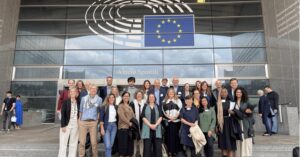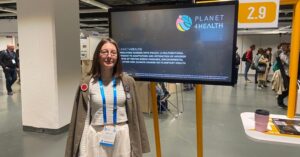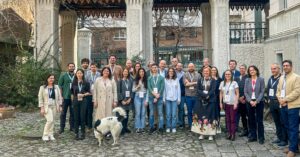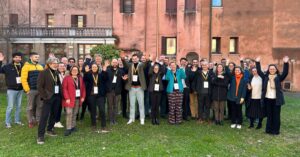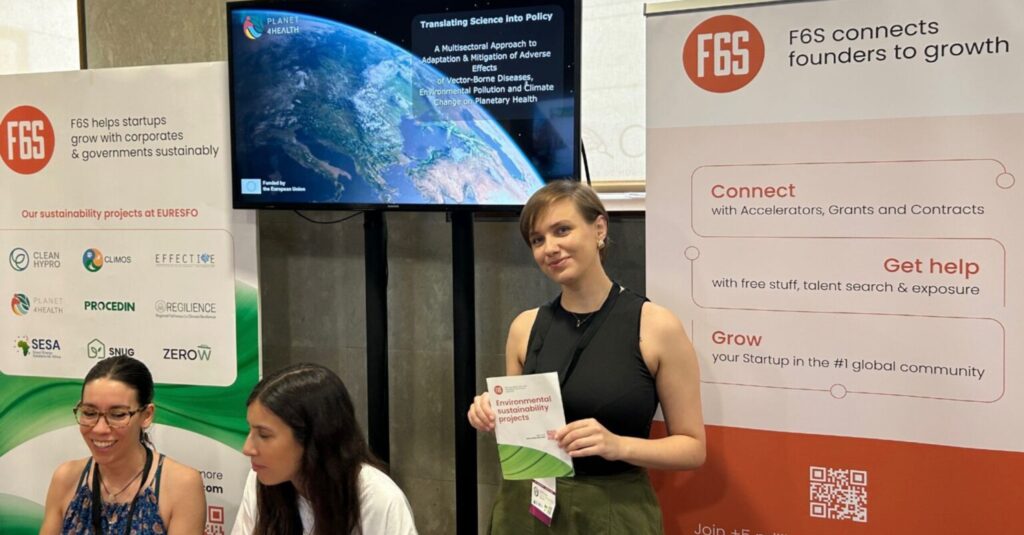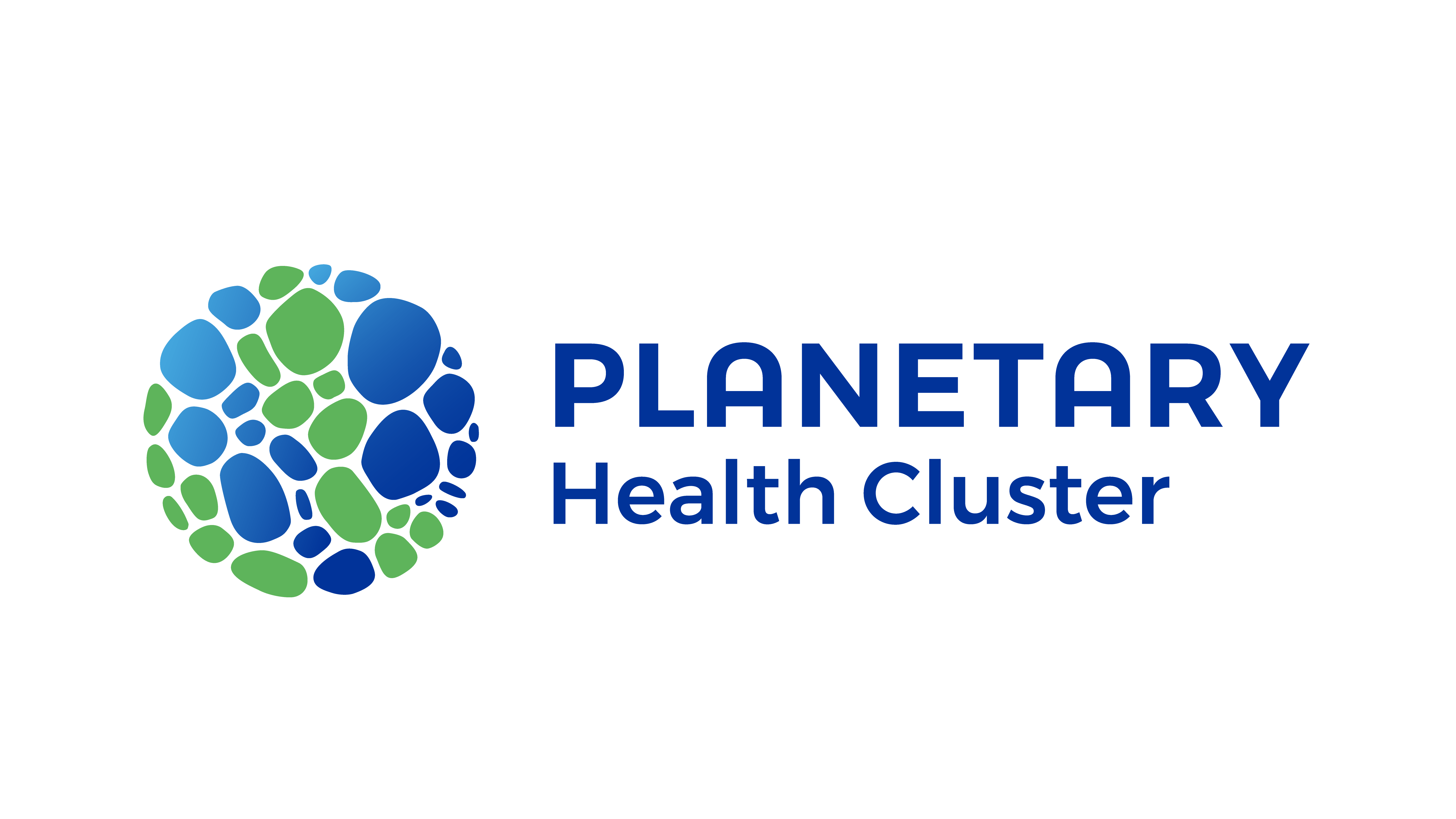From June 26 to 28, 2024, the European Urban Resilience Forum (EURESFO24) was held in the vibrant city of Valencia, Spain. This annual event has become a cornerstone for urban resilience, attracting city leaders, climate experts, policymakers, and stakeholders from across Europe and beyond to collaborate on strategies for building resilient cities in the face of climate change and other urban challenges.
The 2024 edition of EURESFO was built around three key thematic streams and a fourth special thematic stream, each addressing crucial aspects of resilience, sustainable development and recovery. The first stream focused on multilevel governance, cooperation, and the imperative of a just transition. The second thematic stream delved into water resilience and the promotion of the Blue Economy within and beyond the Mediterranean region. The third stream aimed at enabling the transformation towards resilient, adaptive, and climate-neutral cities and regions. The fourth special stream focused on building resilience in fragile settings and bridging the gap between Humanitarian Response to Post-conflict Resilience and Recovery.
One of the fascinating aspects was the diverse range of perspectives and approaches to resilience. From climate change adaptation to a broader view addressing various future threats, the approach varies based on the specific context and framework within which cities operate.

Cities are accelerating their transitions toward a net zero, climate-resilient future, showcasing urgency and leadership that all levels of government must acknowledge. Achieving climate neutrality by 2030 requires a collective, all-of-society approach. Securing support from all government levels is crucial for creating inclusive, thriving cities for everyone. As host city Mayor María José Catalá Verdet highlighted:“We cannot achieve true energy transition and sustainability without considering those who have less.” Cities in Spain are leading by example, forming City Climate Contracts with national and regional stakeholders, inspiring broader efforts to garner support and speed up transitions.
Cities also emphasized the importance of building trust and collaborating on solutions at the community level to scale up action. Valencia, Greater Manchester, and London are effectively gaining local support and delivering results by co-designing projects that address heat and flood risks, meeting the urgent needs of their communities.
Financing climate adaptation is a significant challenge that local governments cannot meet alone. Collaboration with the wider public and private sectors is essential. Cities are adopting a holistic approach to investing in climate resilience, developing comprehensive portfolios of investment-ready projects.
Another key takeaway was the urgent need for sustainable and resilient actions, highlighting the necessity for flexible financing, swift project implementation, and stronger public-private partnerships to meet the ambitious climate goals by 2030. The insights and strategies discussed emphasized the collective effort required to transform cities into sustainable and livable environments for all.
PLANET4HEALTH at EURESFO24 – Promoting Planetary Health
During EURESFO24, the PLANET4HEALTH project actively promoted its mission to address the impacts of environmental degradation on human, animal, and ecosystem health. Collaborating with other projects and initiatives in the field of sustainable development and urban resilience, PLANET4HEALTH highlighted the importance of integrating Planetary Health considerations into climate resilience strategies. The mission of PLANET4HEALTH is to generate new knowledge and tools that address the impacts of environmental degradation on human, animal, and ecosystem health. Through advocacy and collaboration with like-minded projects and initiatives, PLANET4HEALTH aims to promote sustainable Planetary Health policies and raise public awareness. This aligns with efforts to enhance community well-being and resilience in the context of climate change and environmental threats. EURESFO24 was a great opportunity to highlight the project’s role in advancing sustainable Planetary Health.

Valencia sets the stage
Valencia, distinguished as the European Green Capital for 2024, was the perfect place for this year’s forum. The city’s commitment to sustainable development is evident in its extensive efforts to reduce carbon emissions, promote renewable energy, and improve public transportation. Valencia’s network of bike lanes and pedestrian areas, along with its green spaces and urban gardens, boosts air quality and biodiversity. The city’s advanced waste management system and innovative water management strategies demonstrate a proactive approach to environmental sustainability.
Engaging Workshops and Sessions
The forum began with an electrifying opening plenary meeting, introducing mayors and city representatives from the Metropolitan Region of Arnhem-Nijmegen, Tallinn, Sofia, Leuven, and Heidelberg. This first session, themed “Transforming Europe Together: Mayors for Integrated Climate Action,” definitely set the tone for the event. It provided participants with a comprehensive overview of the collaborative efforts and innovative strategies these cities are implementing to integrate climate action into urban resilience planning.
Throughout the 3 days event, a series of interactive sessions and workshops and study visits have been designed to foster collaboration and knowledge exchange. Topics covered included:
- Adaptation finance: Concrete and sustainable solutions to bridge the gap between financiers and Cities climate-neutral cities and regions;
- Multi-level Governance: Effective strategies for reinforcing climate resilience through multi-level governance, for regional and national adaptation efforts.
- Climate Adaptation and Mitigation: Innovative approaches to reducing greenhouse gas emissions and adapting to climate impacts.
- Resilient Infrastructure: Strategies for designing and maintaining infrastructure that can withstand extreme weather events and other stressors.
- Community Engagement: Best practices for involving local communities in resilience planning and decision-making processes.
- Digital Resilience: Leveraging digital tools, platforms and technologies to boost urban resilience.
Participants engaged in hands-on activities, shared experiences, and developed actionable plans tailored to their cities’ unique needs.
Networking and Building Partnerships
EURESFO is renowned for its ability to bring people together. This year’s forum provided ample opportunities for networking and partnership building. Participants connected and shared insights during breakout sessions, and explored potential collaborations during evening socials. The vibrant atmosphere of Valencia, combined with the forum’s dynamic program, facilitated meaningful exchanges and the building of lasting professional relationships.
EURESFO Marketplace
Under the umbrella of F6S Innovation, our presence at the Marketplace highlighted innovative projects and platforms dedicated to climate resilience:
- PLANET4HEALTH is a Horizon Europe Health RIA project funded by the European Union. Its mission is to provide new knowledge and tools addressing the impacts of environmental degradation on human, animal, and ecosystem health. Through multidisciplinary collaboration, the project aims to support policy-making processes and raise awareness about sustainable planetary health, climate, and environmental policies. Upholding values such as scientific integrity, sustainability, collaboration, innovation, inclusivity, and community engagement, PLANET4HEALTH addresses complex planetary health challenges through interdisciplinary collaboration. The project conducts research and draws overarching conclusions from four tailored case studies: Vector-borne diseases in the Iberian Peninsula Air pollution and its adverse health effects in South Africa Food safety in Central Europe Mental well-being in environmental and climate contexts.
- CleanHyPro aims at developing and organizing a sustainable Open Innovation Test Bed for electrolysis materials and components for different applications. The OITB will also offer a network of facilities and services through a SEP to companies.
- CLIMOS prepares for climate and environmental impacts on health, using sand fly-borne diseases as a model system to develop innovative health solutions and improve communities’ resilience.
- COPILOT is an open-access platform that provides information on available pilot and demo facilities, helping companies and research institutes find and use these resources.
- DRural builds a service marketplace for European rural areas in the context of the smart villages.
- EFFECTIVE aims to establish large-scale marine protected areas in European seas (30% by 2030) through innovative ecosystem restoration and multi-scale monitoring. This integrated approach includes governance, participation, social engagement, and a new ecosystem-based management framework.
- Foodity aims to develop a dynamic ecosystem of digital solutions for food and nutrition that respect citizens’ rights to personal data sovereignty in Europe.
- INNO4CFIs’ mission is to harness the power of nature-based business models and cutting-edge innovations to Carbon Farming Initiatives (CFIs), ensuring the preservation of biodiversity, water security and soil health.
- NICKEFFECT aims to develop novel ferromagnetic Ni-based coating materials to replace the scarce and costly Platinum and ensure high efficiency in key applications.
- PROCEDIN enhances procurement capabilities to drive innovation by focusing on circular economy and green mobility, aligning with sustainability and resilience goals in European cities.
- REGILIENCE supports cities and regions in developing climate-resilient pathways. It leverages a demand-driven approach and innovative solutions to address local needs and build long-term resilience.
- Restore4Life showcases the socio-economic benefits derived from a comprehensive and interdisciplinary approach to restoring freshwater and coastal wetlands in the Danube basin.
- RURACTIVE empowers rural communities through smart, inclusive innovation.
- SEE BRIDGE aims to strengthen the capacity of social economy, small and medium-sized enterprises (SE-SMEs) operating in energy-intensive industries such as aluminium, steel, iron and others to transition to more resource efficient and energy saving processes and operations in adaptation to CBAM legislation.
- SESA provides scalable and replicable energy access technologies, as well as business models in Africa, fosters local economic development and social cohesion through living labs in countries like Kenya, Ghana, and South Africa.
- SITOLUB seeks to develop cutting-edge digital tools and platforms that integrate cutting-edge technologies in characterization, simulation, and data analytics, to enable the Safe and Sustainable by Design approach for lubricant development.
- SNUG is pioneering sustainable construction solutions, addressing the significant environmental impact of buildings. Through an innovative methodology designed to assist architects and builders in choosing the most appropriate thermal insulation materials and strategies for new construction or renovations, this EU project aims to reshape the construction industry, maximizing energy efficiency, minimizing greenhouse gas emissions and fostering a greener future for buildings and communities.
- SoTecIn Factory: is a collaborative environment aimed at improving the resilience and sustainability of European industry by supporting a community of mission-oriented social innovators and connecting them to technology providers and industrial companies.
- STREAMS aims to advance sustainable battery technologies, contributing to Europe’s resilience and competitiveness. A comprehensive portfolio of at least 12 scalable and flexible technologies and pilot scale solutions for the sustainable production of battery-grade precursors and their respective anode and cathode active materials will be developed, evaluated and successfully demonstrated.
- SustAgri4.0 empowers farmers with digital skills for advanced technologies adoption and sustainable agribusiness.
- SUSRUR aims to help the European tourism sector, heavily impacted by COVID-19, by promoting sustainability and innovation for resilience. Given that SMEs make up over 99% of EU enterprises, they must embrace the green and digital transition to achieve sustainable business practices.
- ZeroW project aims to provide significant contributions to preventing and reducing food waste and enhancing the sustainability of food supply chains. ZeroW will carry out the demonstration of diverse innovations in nine real-life food chains, employing a systemic innovation approach to effectively address the multidimensional issue of food waste.
Looking Ahead
As EURESFO 2024 drew to a close, there was a palpable sense of urgency and optimism. Participants left Valencia inspired and equipped with new ideas and strategies to implement in their cities. The forum underscored the importance of innovative solutions, collaborative action, and strong leadership in making our cities more resilient.
Good News: the next edition will take place in Rotterdam!
See you next year for EURESFO25!
Authors: F6S team
